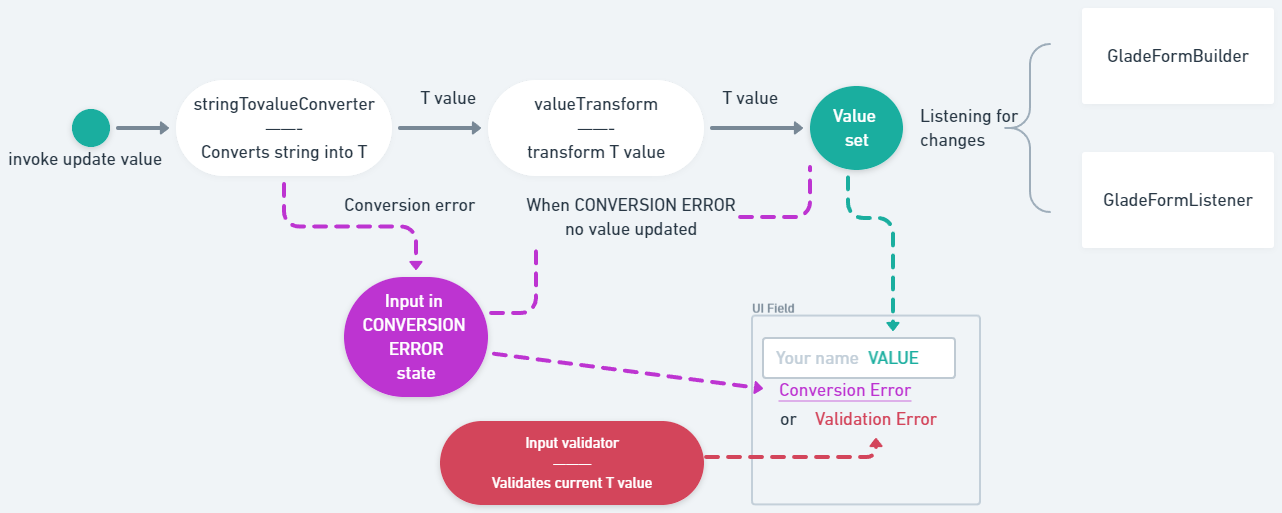GladeInput
Building block of your form
GladeInput
Each form's input is represented by instance of GladeInput<T>. Type T is value held by input.
For simplicity we will interchange input and GladeInput<T>.
Every input is dirty or pure based on whether value was updated (or not, yet).
On each input we can define
- inputKey - Unique identification of each input. Used inside listeners or in dependencies.
- value - Current input's value
- initialValue - Initial input's value. Used with
valueComparatorand for computingisUnchanged. - validator - Input's value must satisfy validation to be valid input.
- validationTranslate - If there are validation errors, this function is use to translate those errors.
- dependencies - Each input can depend on another inputs for listening changes.
- stringToValueConverter - If input is used by TextField and
Tis not aString, value converter should be provided. - valueComparator - Sometimes it is handy to provide
initialValuewhich will be never updated after input is mutated.valueComparatorshould be provided to compareinitialValueandvalueifTis not comparable type by default. Note that GladeForms handle deep equality of collections and assumes that complex types are comparable by values. - valueTransform - transform
Tvalue into differentTvalue. An example of usage can be sanitazation of string input (e.g.: usafe oftrim()before value is saved). - defaultValidationTranslation - If error's translations are simple, the default translation settings can be set instead of custom
validationTranslatemethod. - textEditingController - It is possible to provide custom instance of controller instead of default one.
- trackUnchanged - Setting this to false means that
GladeModelwill not include input in theisUnchangedproperty evaluation. - isRequired - If set to true, the input must be filled in order for the form to be valid. (Consult specific variant for precise meaning of this property.)
Most of the time, input is created with .create() factory with defined validation, translation and other properties.
An overview how each input's value is updated. If needed it is converted from string into T, then transformed via valueTransform (if provided), after that new value is set.

Before defining your input consider to use existing input types provided by GladeForms.
Specific input types
GladeForms provides several predefined input types to cover most of the use cases. These inputs comes with built-in validation and other useful features.
GladeIntInput and GladeIntInputNullable
Input that holds integer values. GladeIntInputNullable is a variant that allows null values. Provides built-in string to integer conversion.
Accepts specialised variant of Validator that works with integer values. This validator provides built-in checks for common integer constraints, such as isMin(), isBetween() and more.
GladeBoolInput
Input that holds boolean values. Provides built-in string to boolean conversion.
GladeDateTimeInput and GladeDateTimeInputNullable
Input that holds date and time values. GladeDateTimeInputNullable is a variant that allows null values. Provides built-in string to date and time conversion using standard Dart DateTime parsing.
Accepts specialised variant of Validator that works with date and time values. This validator provides built-in checks for common date and time constraints, such as isBefore(), isAfter() and more.
GladeStringInput
Input that holds string values.
By default uses textEditingController (useTextEditingController: true).
Activating the useTextEditingController mode for a GladeInput results in a few behavioral modifications:
- The input automatically creates a TextEditingController and incorporates its own listener.
- Whenever TextEditingController's text changes, input will automatically update its value. If StringConverter is needed it will use it.
- Consequently, developers are advised to provide only the controller property and a validator to the widget.
- While the use of updateValue (or similar methods) and
resetToInitialValue()remains possible, be aware that these actions will override the text in the controller and reset text selection and other keyboard-related features.
GladeStringInput uses specialised validator that works with string values. This validator provides built-in checks for common string constraints, such as minLength(), maxLength() and more.